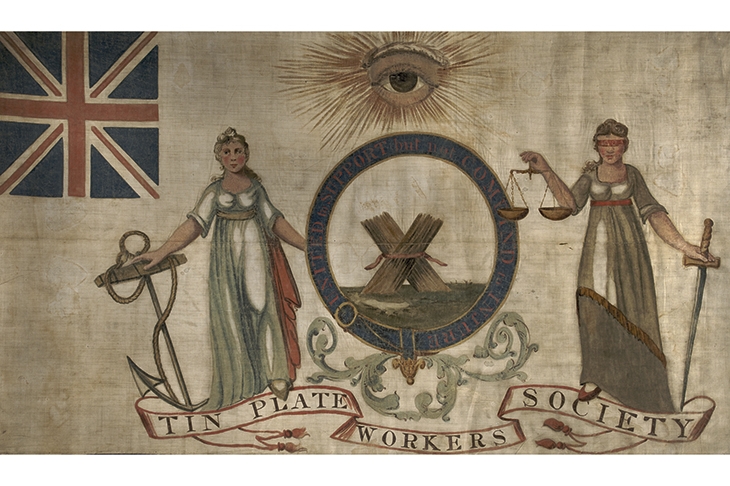I love the labour movement. I love its history, its traditions, its brass bands and banners. I love its rousing songs, anthems and festivals. I love its slogans and rallying cries, inspired, as they are, by an abiding faith in the collective spirit and the seductive vision of the New Jerusalem.
For all that tribalism is given a bad name these days — sometimes with good reason — I feel tribal about my attachment to the labour movement. And I offer no apology for that. As it was for millions of others who grew up in working-class communities, tribalism in the cause of labour was for me less a matter of choice and more one of imperative. This wasn’t like choosing a football team; this was about recognising the place of our people in the prevailing economic order and understanding that advancing our interests meant not waiting submissively for some benevolent ruling class to come to our aid, but organising through our own democratic institutions to challenge society’s injustices. It was through the vehicle of the labour movement that the lives of millions — in the workplace and beyond — were transformed for the better, spiritually as well as materially.
Decent wages, robust safety-at-work laws, paid holidays, sanitary and affordable housing, a welfare system, universal healthcare: these are the things the labour movement played a pivotal role in securing for people like us. The movement was on our side, and I knew it from early on. It is why I joined a trade union at the age of 16 immediately on landing a Saturday job stacking shelves at the Dagenham branch of Asda (which happened to fall quite literally within the shadow of the famed Ford motor plant, the setting for the totemic 1960s struggle of the women machinists) and then the Labour party three years later. It is why I have been a foot soldier of the movement ever since, serving on the executive of a prominent trade union and taking part in more demonstrations, marches and strikes than I care to remember. The movement is not only an intrinsic part of our nation’s modern history, but incontestably a force for good, and I would go toe to toe with anyone who argues to the contrary.
So it grieves me beyond measure to see both the movement’s wings — political in the form of the Labour party, industrial in the form of trade unions — so far removed, physically and ideologically, from the very people and communities they exist to serve.

What began as a strain in the relationship between the party and its traditional working-class base in the late 1980s, when the former began to imbibe a poisonous brew of economic and social liberalism, became a decisive fissure 12 months ago when the Red Wall collapsed in spectacular fashion at the general election. The Labour party, it seemed, was no longer the voice of labour, and neither were its union partners, who over the same 30 years or so had haemorrhaged members, retreated to their public sector redoubt and increasingly become the mouthpiece not of ordinary workers but of the London liberal class.
I seek no personal kudos when I say I saw this schism coming a long way off. For more than a decade, through my interventions in the movement and the media, I warned anyone who would listen that a storm was brewing in working-class communities and that the left would eventually find itself caught in the eye of it. I knew it first when I saw what was happening in my own backyard in the early years of this century. Here, something greater than a storm — more a whirlwind — was ripping through my home borough of Barking and Dagenham in east London. A hitherto settled working-class, blue-collar community, a Labour heartland, was experiencing the sudden dramatic effects of globalisation, in the form of de-industrialisation and rapid demographic change. Production at Ford was on its last legs, entire neighbourhoods were transforming at breathtaking speed, and local services began feeling the strain of a population surge. (The foreign-born population of Barking and Dagenham rose by 205 per cent in the decade 2001-11: by far the highest increase of any London borough. During the same period, the percentage of residents identifying as ‘White British’ plunged from 81 to 49 per cent, the largest decrease of any local authority in England and Wales.)
It grieves me beyond measure to see the labour movement so far removed from the people it exists to serve
Local residents grew anxious. This new world of large-scale and unfettered movements of capital and labour, of swift and deep-seated economic and cultural change, seemed to bring them very few benefits. Yet when they looked to their representatives in the labour movement to speak up for them, they were met with patronising lectures about how their new environment would bring cultural enrichment and improved GDP. These representatives trumpeted the profound changes as a symbol of a modern, vibrant Britain, and if folk objected, well, they were small-minded racists.
But, for the most part, local people bore no personal ill will towards the new arrivals. Theirs was an anxiety born not of racial bigotry but of sudden disorientation and dislocation. Their sense of order had been violated, not their sense of race. They were not opposed to immigration per se. Their unease sprang from the sheer speed and scale of the changes, and their doubts about the ability of the place to cope. And their fire was directed not at their new neighbours but at a political establishment, comprising mainly an arrogant liberal class, that had turned a tin ear to their concerns.
Two things happened in those early years of the century to illustrate the depth of local anger. First, Barking and Dagenham returned a dozen BNP councillors at the local elections. It was a desperate last plea for help. Second, large numbers just moved away. In the decade to 2011, 40,000 residents left Barking and Dagenham — for many, the only place they had ever called home. Among them were many of my friends and neighbours. Now they were heading for Kent or the Essex coast: an exodus that some would misdiagnose as ‘white flight’, but would better be described as a flight to familiarity. I had a front-row seat as, in just a few short years, this stable and harmonious working-class community become atomised, volatile and fertile territory for the far right.
For Barking and Dagenham, read countless other communities across post-industrial, small-town and coastal Britain. It was their alienation that brought us Brexit and the massacre of the Labour party. Those of us who witnessed first-hand the growing sense of dispossession were not in the least surprised when these political earthquakes occurred. I knew back then that this thing was heading inexorably in one direction.
I document these experiences in my new book Despised: Why the Modern Left Loathes the Working Class. I came to see during those tumultuous years in Barking and Dagenham that large sections of the left, including many of my own allies, actively hated the very people for whom they purported to speak. A left that increasingly saw globalism and cosmopolitan liberalism as the end points of all economic and social progress gradually began to harbour a deepening contempt for the small ‘c’ conservatism of the working classes and their hankering for something more than money and individual rights — something rooted in the concepts of place and social solidarity. This new left, with its enthusiasm for personal autonomy and open borders, simply couldn’t comprehend why those who enjoyed less in the way of opportunity for travel or self-advancement might, as a result, be imbued with a heightened sense of rootedness and belonging. Family, community and relationships take on so much more meaning when strict limitations are placed on your life chances.
The private antipathy that many on the modern left felt towards the traditional working classes would eventually evolve into a full-scale culture war against them. If you were out of step — as many who live in these communities still are — with ‘progressive’ opinion on issues such as immigration, same-sex marriage, state-sponsored multiculturalism, trans rights or, more recently, Black Lives Matter, if you still held true to that old rubbish about ‘faith, family and flag’, then you were beyond the pale. Such attitudes, in the minds of much of today’s left, were redolent of the worst kind of social conservatism and really ought not to be exhibited in civilised society. And with so many of such a mind enjoying positions of authority in our media and public institutions, an environment was created, quite purposely, in which the expression of such outdated or unfashionable views, particularly by those who held any sort of public profile, was met with fierce denunciation and demands for the transgressor’s head on a platter.
This soft totalitarianism — for that is what it amounts to — is utterly alien to the labour movement’s democratic and pluralist traditions, and serves only to widen the gulf between it and the working class. It also provides free kick after free kick to the right, which always benefits far more from culture wars than it does from arguments over economics. I detest the way in which this pernicious ideology has infected my movement, and I want rid of it. I agitate every day for the movement to return to its proud, patriotic, communitarian traditions — rooted in the principles of family, vocation, reciprocity and social solidarity — and to reject the toxic combination of 1960s hyper-liberalism and hard-left authoritarianism: an unappealing fusion of Lennon and Lenin, which has become its stock in trade.
Go to the People’s History museum in Manchester, and you will find the earliest example of a trade union banner, made for the Tin Plate Workers’ Society in 1821. Emblazoned in a corner of the banner is the union flag, a nod to the patriotic sentiments of the society’s members. Likewise, attend the annual Durham Miners’ Gala and witness the procession of lodge banners displaying images and quotations drawn from the Christian tradition. Or study the labour movement’s roots in co-operatives, mutuals and friendly societies — the ‘little platoons’ that were once the lifeblood of civil society. Or think about the rich lineage of socialist newspapers and other literature illustrative of a deep commitment to open debate and diversity of opinion. These things are the heritage of the labour movement, and they should still lie at its heart — rather than the globalism, groupthink and identity politics peddled by so many of its current activists.
A confident, thriving labour movement is essential to the wellbeing of our working-class communities. That such a chasm has emerged stands as a tragedy; one for which, ultimately, the entire nation will continue to pay a price.






Comments